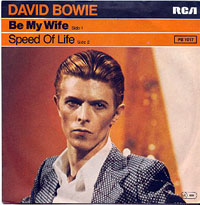This article needs additional citations for verification .(June 2022) |
| "Be My Wife" | ||||
|---|---|---|---|---|
 | ||||
| Single by David Bowie | ||||
| from the album Low | ||||
| B-side | "Speed of Life" | |||
| Released | 17 June 1977 | |||
| Recorded | September–November 1976 | |||
| Studio | Château d'Hérouville (Hérouville, France) | |||
| Genre | Art rock | |||
| Length | 2:55 | |||
| Label | RCA | |||
| Songwriter | David Bowie | |||
| Producers |
| |||
| David Bowie singles chronology | ||||
| ||||
| Spanish cover | ||||
 | ||||
| Music video | ||||
| "Be My Wife" on YouTube | ||||
"Be My Wife" is a song by the English singer David Bowie from his eleventh studio album Low (1977). It was released as the second single of the album on 17 June 1977.
Contents
"Be My Wife" became the first new Bowie release since "Changes" to fail to break into the UK chart. The song reached number 57,at that time the official list only compiled the top 50 positions,but it appeared on Breakers for 2 weeks. It was frequently played live on the various tours after its release and Bowie is said to have repeatedly announced this song during live performances as "one of my favourites," as may be seen or heard in such concert footage or audio recordings.